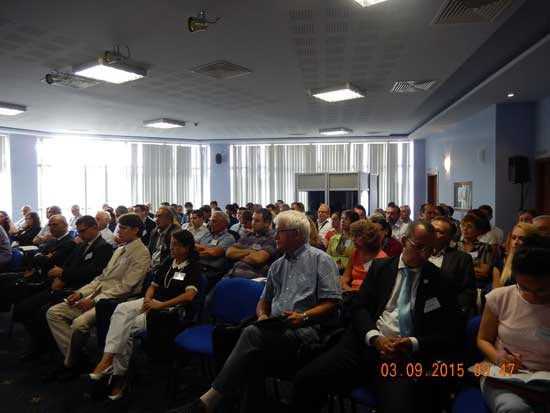

The Bulgarian Nuclear Society’s main activities during 2015
The traditional international scientific conference of the Bulgarian Nuclear Society Nuclear power for the People took place on 2-5 September 2015 in the town of Sozopol. As always, we aimed at providing a reasonable forum and give a wider range of participants and companies the possibility to present their achievements and to take part in the discussions. The conference was held with the kind assistance of the Bulgarian Atomic Forum, Kozloduy NPP Plc and the European Nuclear Society.

Over 130 participants discussed the topics of the day in the field of nuclear sciences and technologies concerning our common present and future as nuclear specialists.
Contrary to the inconsistent national policy towards nuclear energy there is a visible consolidation of the distinguished scientists’ and experts’ vision. This gives us confidence of the rightness of our policy and hope in the success of the goals set.
Participants from IAEA Vienna, Joint Research Centre-EC Petten, the Institute for Knowledge Management-Vienna, Kurtshatov Institute-Moscow, American Nuclear Society, Romania, France, Hungary, Ukraine, South Korea, Turkey, Germany, Canada, Macedonia presented their vision and programmes for the future of nuclear energy.
The Bulgarian specialists reported on the latest achievements and visions to important current topics as the lifetime extension of Units 5 and 6 of Kozloduy NPP, the decommissioning process of Units 1-4 of Kozloduy NPP, safety measures, personnel motivation etc. Big interest among the participants was provoked from the reports related to the nuclear technology novelties, dosimetry and ionizing radiation applications in medicine and industry, as well as from the National Framework for responsible and safe management of spent fuel and radioactive waste according to COUNCIL DIRECTIVE 2011/70/EURATOM of 19 July 2011.
In the traditional Young Author’s Competition the following reports were awarded for presented original conclusions of scientific and professional challenges.
.jpg)
Oral Presentations
1st place- Denitza ZGUREVA, and Silviya Boycheva, “Technical University of Sofa, BG, “Synthesis of sodalite from coal fly ash as a potential adsorbent in nuclear safety systems”.
2nd place - Elena KOSTADINOVA, Vencislav Rusanov, Tatyana Avdjieva, Sofia University "St. Kliment Ohridski", BG, ’’Physics-Based Methods for Studying Nuclear Reactor Steels’’.
3rd place - Stanislav YANACHKOV, Technical University of Sofia, BG, ''Algorithm and software implementation of the model for calculating the starting characteristics of the VVER type reactors''.
Poster Presentations
Hristiyan Kolev, Technical University of Sofia, BG, ''Thorium fuel cycle with molten salts''
Nuri BEYDOGAN, Gencer Konur, Gulcin Sarici, Osman Sahin Celikten, Mehmet Turkmen, Cemal Niyazi Sokmen, Hacettepe University, Ankara, TR, ’’Pin Cell Simulation of the Change in Doppler Broadening and Self-Shielding with the Change in Nuclear Fuel Temperature and Fuel Type by using OpenMC’’
The closing session of the conference adopted a resolution regarding the Open letter to the Bulgarian government and the public.
The letter serves to remind that without the nuclear component in the energy mix the price of the electricity will increase dramatically. This fact will influence directly the price for the end consumers that could reach amounts beyond the strength not only for the household consumer but for industry as well.
The consequences for the environment will be serious not only on a national level but in global dimension as well. According to EUROSTAT data, air pollution from dust in many settlements substantially exceeds the defined norms. This is why the specialists from BgNS call on the Bulgarian government to create clean and comfortable conditions and decent quality of life for the future generations through new nuclear build; to retain the perspective and provide impulse for professional development in Bulgaria of the children that make us proud with the earned golden medals in international physics and mathematics competitions; to ensure reliable energy supplies at predictable prices for the Bulgarian industry and our international partners for decades ahead.
The 40th Anniversary of European Nuclear Society
Within the period 1991 – 2001 BgNS always received appreciable assistance and guidance from the executive secretary of ENS. From an educational point of view ENS ensured the participation of an eminent speaker for each of our conferences to present the latest achievements in the nuclear industry.
In Bulgaria, there are 6 reactors installed on the Kozloduy NPP site – 2 VVER-440, model 230, 2 VVER-440 again model 230 which were subject to large scale modernization so that they meet the safety requirements of 213 model. The safety of the latter has been proved by many peer reviews and inspections held by the IAEA, Atomic Questioning Group of the EC, WANO, etc. Units 3 and 4 were prematurely shut down due to political reasons, as a prerequisite for Bulgaria’s accession to the European Union. The last 2 units – 5 and 6, equipped with VVER-1000/320 reactors are in operation and passed through active modernization programme including more than 200 measures for reliability and safety enhancement.
Within the period 2006 - 2015 there are planned decommissioning activities on units 1-4 and actions for units 5 and 6 lifetime extension in place. The work on RAW treatment facility is progressing, as well as the project for construction of National repository for low and medium level RAW. Decision in principle has been taken for the construction of new nuclear Unit 7 on Kozloduy NPP site.
Nuclear researches are engaged in nuclear safety as well as in medical activities.
The various events arranged by ENS as RRFM and TopFuel are always a good forum for discussion of the research topics, topics related to nuclear safety etc.
Creating and engaging more young professionals in nuclear engineering and applications is an important issue nowadays. Decreasing the number of young people involved in the nuclear industry obviously affects the quality of work and the opportunities for development and expansion of nuclear applications. Professionals with high level knowledge and skills are needed – these are the challenges that we foresee for the future. In this relation ENS jointly with the nuclear societies must play important role.
|

